8 citations,
July 2020 in “Clinical, cosmetic and investigational dermatology” Excessive sun protection might cause frontal fibrosing alopecia by disrupting skin immune balance.
 15 citations,
April 2003 in “Journal of dermatology”
15 citations,
April 2003 in “Journal of dermatology” Alopecia areata causes hair loss due to an immune attack on hair follicles, influenced by genetics and environment.
 1 citations,
December 2021 in “Annals of phytomedicine”
1 citations,
December 2021 in “Annals of phytomedicine” The herbal hair dye with a 1:2 henna to indigo ratio works well, is safe, and eco-friendly.
 37 citations,
September 2007 in “International Journal of Pharmaceutics”
37 citations,
September 2007 in “International Journal of Pharmaceutics” PPCM microspheres allow controlled finasteride release over 24 hours.
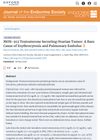 April 2020 in “Journal of the Endocrine Society”
April 2020 in “Journal of the Endocrine Society” A rare ovarian tumor that produced testosterone caused a blood clot in the lungs and increased red blood cells in a woman.
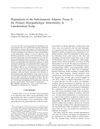 32 citations,
June 2003 in “The American Journal of Dermatopathology”
32 citations,
June 2003 in “The American Journal of Dermatopathology” Lipedematous scalp is mainly caused by an increase in fat tissue under the skin and is different from lipedematous alopecia.
January 2022 in “Journal of Morphological Sciences” A woman's rare ovarian tumor was treated with surgery, which stopped her symptoms and normalized her hormone levels.
 35 citations,
January 2002 in “Dermatology”
35 citations,
January 2002 in “Dermatology” A woman's hair loss during treatment with specific hepatitis C drugs grew back after stopping the medication.
 2 citations,
October 1990 in “The Lancet”
2 citations,
October 1990 in “The Lancet” Some people have a genetic variation that makes them less effective at breaking down drugs.

Finasteride treats hair loss and prostate issues by lowering certain hormone levels.
 June 2000 in “Journal of Oral and Maxillofacial Surgery”
June 2000 in “Journal of Oral and Maxillofacial Surgery” Hair transplantation is an effective method to restore hair.
160 citations,
April 2008 in “Baillière's best practice and research in clinical endocrinology and metabolism/Baillière's best practice & research. Clinical endocrinology & metabolism” DHT in the human prostate is produced through multiple pathways, not just from testosterone.
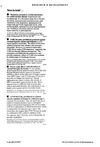 July 1993 in “Inpharma Weekly”
July 1993 in “Inpharma Weekly” Dicentrine reduced heart disease risk factors in rats, T-588 protected mice brains without side effects, Provir blocked herpes virus and lessened mouse symptoms, and LY191704 could treat hair loss and prostate issues.
11 citations,
January 2009 in “Acta Dermato Venereologica” Early and aggressive treatment can significantly regrow hair in discoid lupus erythematosus.
 15 citations,
October 1981 in “Archives of internal medicine”
15 citations,
October 1981 in “Archives of internal medicine” Minoxidil can cause severe skin reactions like Stevens-Johnson syndrome in rare cases.
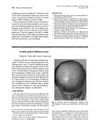 9 citations,
November 1993 in “Journal of The American Academy of Dermatology”
9 citations,
November 1993 in “Journal of The American Academy of Dermatology” Some men can have female pattern baldness without hormonal abnormalities or signs of feminization.
 November 2017 in “International journal of family & community medicine”
November 2017 in “International journal of family & community medicine” A man's low testosterone and related symptoms improved after he stopped taking hair loss drugs.
88 citations,
September 2003 in “Clinical endocrinology” Hormone treatment for transsexual individuals is effective but carries risks like thromboembolic events and mood changes, with most side effects being minor and reversible.
 17 citations,
May 2008 in “Pharmacopsychiatry”
17 citations,
May 2008 in “Pharmacopsychiatry” Finasteride improved symptoms in a schizophrenia patient.
 8 citations,
September 1997 in “Postgraduate medicine”
8 citations,
September 1997 in “Postgraduate medicine” Older women often have vulva issues due to less estrogen, which can be misdiagnosed and lead to wrong treatments.
36 citations,
January 2003 in “Molecular and Cellular Biochemistry” 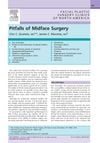 5 citations,
August 2005 in “Facial Plastic Surgery Clinics of North America”
5 citations,
August 2005 in “Facial Plastic Surgery Clinics of North America” Midface surgery complications are generally rare and manageable with skilled surgery and informed patients.
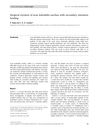 24 citations,
October 2007 in “Clinical and experimental dermatology”
24 citations,
October 2007 in “Clinical and experimental dermatology” Surgical excision with natural healing effectively treats acne keloidalis nuchae without recurrence.
 June 2007 in “Men in Nursing”
June 2007 in “Men in Nursing” The document emphasizes early detection and treatment of men's skin conditions and recommends protective measures and appropriate treatments for different age groups.
 2 citations,
June 2020 in “AIDS”
2 citations,
June 2020 in “AIDS” Recreational drug use can cause misdiagnosed conditions and drug interactions in HIV patients.
 April 2003 in “Journal of Cutaneous Medicine and Surgery”
April 2003 in “Journal of Cutaneous Medicine and Surgery” Some treatments work better for different types of hair loss, and nutrients like iron and L-lysine are important for preventing hair loss.
 11 citations,
January 2007 in “Veterinary dermatology”
11 citations,
January 2007 in “Veterinary dermatology” Fulvestrant at 10 mg/kg does not promote hair regrowth in dogs with alopecia X.
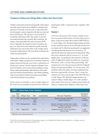 April 2018 in “Dermatologic Surgery”
April 2018 in “Dermatologic Surgery” A new surgical technique using vellus hair grafts effectively treated vitiligo without causing unwanted hair growth.
24 citations,
March 2009 in “Archives of dermatological research” The combination of oral PUVA and corticosteroids helps regrow hair in severe alopecia areata.
30 citations,
March 2007 in “Expert opinion on drug safety” Cetuximab often causes skin rashes, and managing these is important for cancer treatment.





















